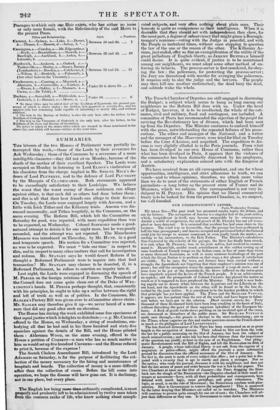SUMMARIES.
THE labours of the two Houses of Parliament were partially in- terrupted this week,—those of the Lords by their reverence for Ash Wednesday ; those of the Commons by a reverence of a more intelligible character—they did not sit on Monday, because of the death of the mother of their excellent Speaker. The Lords were occupied on Monday in listening to Lord ELDON'S vindication of his charicter from the charge implied in Mr. SPRING RICE'S de- fence of Lord Prxxxsrr, and to the defence of Lord PLUNKETT by the Marquis of CLANRICARDE. Both statements appeared to be exceedingly satisfactory to their Lordships. We believe the worst that the worst enemy of these noblemen can allege against either, is that each did as others had done before theta ; and this is all that their best friends can allege in their favour. On Tuesday, the Lords were engaged largely with Ancona, and a little with Irish Tithes and the Kilkenny trials. Ancona was dis- cussed measuredly, and Tithes lengthily, in the Commons, on the same evening. The Reform Bill, which left the Committee on Saturday for good, was reported, with more expedition than was to be expected, on Wednesday. Colonel SIBTHORP made a good- natured attempt to detain it for one night more, but he was poorly seconded, and the attempt was not repeated. The Manchester Massacre was introduced on Thursday, by Mr. HUNT, in a good and temperate speech. His motion for a Committee was rejected, as was to be expected. We must " bide our time " in respect to this, and in respect to many other matters that call for investigation and redress. Mr. STANLEY says he would desert Reform if he thought a Reformed Parliament were to inquire into that foul transaction ! Mr. STANLEY may chance to be deserted, if, in a Reformed Parliament, he refuse to sanction an inquiry into it.
Last night, the Lords were engaged in discussing the speech of M. PERIER on the foreign relations of France. The President of the Council does not come quite clean out of the Duke of WEL- IINGTOWS hands. M. PERIER perhaps thought, that, consistently with his principles, he ought to take up a milieu between the right and left of truth as well as of politics. In the Commons, Mr. SADLER'S Factory Bill was given over to a Committee above stairs : Mr. SADLER may therefore give it up—we never heard of a mea- sure that did any good after such an elevation.
The House has during the week exhibited some fine specimens of that equal justice which it delights to distribute;—e. g. Mr. CROK.ER offered to the House, on Wednesday, a string of resolutions, em- bodying all that he had said in his three hundred and sixty-five speeches against the details of the Bill, and the House printed them : Alderman WOOD, on the same evening, offered to the House a petition of COBBETT—a man who has as much matter in him as would set up five hundred Caogeas—and the House refused to print it, because of the expense !
The Scotch Cholera Amendment Bill, introduced by the Lord Advocate on Saturday, is for the purpose of facilitating the col- lection of the money necessary for the hiring and maintenance of hospitals and boards. The collection of money is a more difficult affair than the collection of cases. Before the bill come into operation, we hope the disease will have gone out. It is declining, not in one place, but every place.


























 Previous page
Previous page